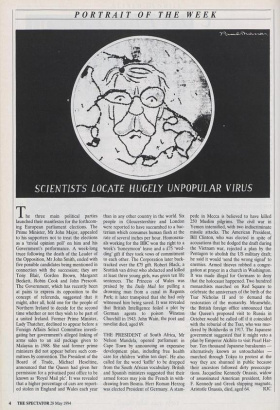PORTRAIT OF THE WEEK
The three main political parties launched their manifestos for the forthcom- ing European parliament elections. The Prime Minister, Mr John Major, appealed to his supporters not to treat the elections as a `trivial opinion poll' on him and his Government's performance. A week-long truce following the death of the Leader of the Opposition, Mr John Smith, ended with five possible candidates being mentioned in connection with the succession; they are Tony Blair, Gordon Brown, Margaret Beckett, Robin Cook and John Prescott. The Government, which has recently been at pains to express its opposition to the concept of referenda, suggested that it might, after all, hold one for the people of Northern Ireland to decide for the second time whether or not they wish to be part of a united Ireland. Former Prime Minister, Lady Thatcher, declined to appear before a Foreign Affairs Select Committee investi- gating her government's alleged linking of arms sales to an aid package given to Malaysia in 1988. She said former prime ministers did not appear before such com- mittees by convention. The President of the Board of Trade, Michael Heseltine, announced that the Queen had given her permission for a privatised post office to be known as 'Royal Mail plc'. It was revealed that a higher percentage of cars are report- ed stolen in England and Wales each year than in any other country in the world. Six people in Gloucestershire and London were reported to have succumbed to a bac- terium which consumes human flesh at the rate of several inches per hour. Homosexu- als working for the BBC won the right to a week's `honeymoon' leave and a £75 'wed- ding' gift if they took vows of commitment to each other. The Corporation later back- tracked over the £75 gift. Robert Black, a Scottish van driver who abducted and killed at least three young girls, was given ten life sentences. The Princess of Wales was praised by the Daily Mail for pulling a drowning man from a canal in Regents Park; it later transpired that she had only witnessed him being saved. It was revealed that British Intelligence foiled a plot by German agents to poison Winston Churchill in 1943. John Wain, the poet and novelist died, aged 69.
THE PRESIDENT of South Africa, Mr Nelson Mandela, opened parliament in Cape Town by announcing an expensive development plan, including free health care for children 'within ten days'. He also called for the word `Icaffir' to be dropped from the South African vocabulary. British and Spanish ministers suggested that their armed forces may join the French in with- drawing from Bosnia. Herr Roman Herzog was elected President of Germany. A stam- pede in Mecca is believed to have killed 250 Muslim pilgrims. The civil war in Yemen intensified, with two indiscriminate missile attacks. The American President, Bill Clinton, who was elected in spite of accusations that he dodged the draft during the Vietnam war, rejected a plan by the Pentagon to abolish the US military draft; he said it would 'send the wrong signal' to enemies. Armed thieves robbed a congre- gation at prayer in a church in Washington. It was made illegal for Germans to deny that the holocaust happened. Two hundred monarchists marched on Red Square to celebrate the anniversary of the birth of the Tsar Nicholas II and to demand the restoration of the monarchy. Meanwhile, the British foreign office announced that the Queen's proposed visit to Russia in October would be called off if it coincided with the reburial of the Tsar, who was mur- dered by Bolsheviks in 1917. The Japanese government suggested that it might veto a plan by Emperor Akihito to visit Pearl Har- bor. Ten thousand Japanese burakumin alternatively known as untouchables marched through Tokyo to protest at the way they are shunned in public because their ancestors followed dirty preoccupa- tions. Jacqueline Kennedy Onassis, widow of assassinated American president, John F. Kennedy and Greek shipping magnate, Aristotle Onassis, died, aged 64. RJC


























































 Previous page
Previous page